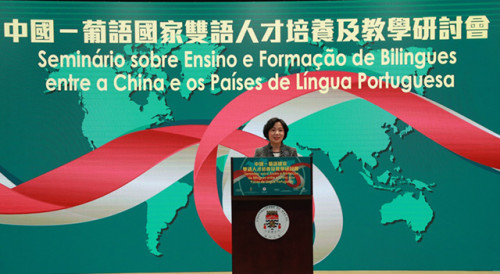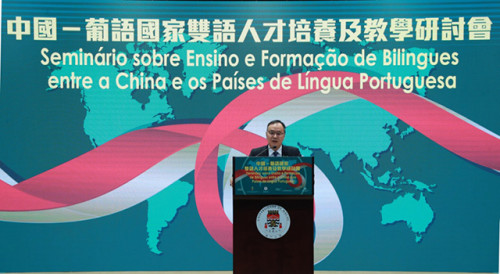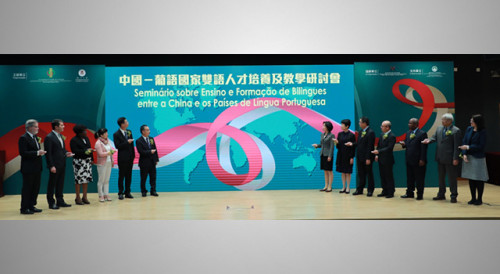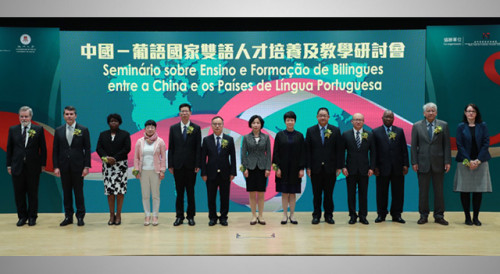The 2018 edition of the “Workshop on Teaching and Training of Bilingual Professionals for China and Portuguese-speaking Countries”, organised by the Permanent Secretariat of the Forum for Economic and Trade Co-operation between China and Portuguese-speaking Countries (Macao) and the University of Macau, is taking place on December 7 and 8 at the University of Macau. The event is co-organised by the Macao Trade and Investment Promotion Institute and supported by the Tertiary Education Services Office.
This is the second edition of such a workshop in Macao. The first was in 2015. The goal of both has been to discuss the demand for staff bilingual in Chinese and Portuguese in the economic, trade, cultural and legal sectors, and to share experiences related to training of such staff, thus underlining the advantages of Macao in this field and supporting the development of a Training Centre for Chinese-Portuguese Bilingual Professionals in Macao.
The Secretary-General of the Permanent Secretariat of Forum Macao, Xu Yingzhen; the Rector of the University of Macau, Song Yonghua; the Director of the Culture and Education Department of the Liaison Office of the Central People’s Government in the Macau SAR, Xu Ting; the Director of the Department of Public Diplomacy and Information of the Office of the Commissioner of the Ministry of Foreign Affairs of PRC in Macao SAR, Zheng Xinyou; the President of the Macao Foundation, Wu Zhiliang; the Acting President of the Administrative Committee of the Macao Trade and Investment Promotion Institute, Irene Va Kuan Lau; and the Deputy Director of the Tertiary Education Services Office, Chang Kun Hong, attended the latest workshop’s opening ceremony on December 7. Secretary-General Ms Xu and Rector Mr Song gave speeches during the event.
Ms Xu stated in her speech that promoting the training of staff bilingual in Chinese and Portuguese was an important part of the “Strategic Plan for Economic and Trade Cooperation”, a document signed during the 5th Ministerial Conference of Forum Macao. This is because such training works to create a source of professional talent to help position Macao as cooperation platform. The Permanent Secretariat of Forum Macao attaches great importance to such training, Ms Xu said. With the joint effort of all relevant parties, the “Economic and Trade Co-operation and Human Resources Portal between China and Portuguese-speaking Countries” had been continuously improved, its content and functions continuously optimised and its database of professionals constantly updated, thus helping to satisfy market needs for staff bilingual in Chinese and Portuguese, and promoting the ongoing training of such professionals.
Ms Xu emphasised that Chief Executive Chui Sai On had pointed out in the Macao SAR Government’s “Policy Address for the Fiscal Year of 2019”, on November 15, that it was necessary better to coordinate resources and infrastructure allocated by local higher education institutions to the training of people bilingual in Chinese and Portuguese, and to develop a training base for staff bilingual in those two languages. In recent years, the SAR Government had been promoting such work, namely through the establishment of a working group on the training of qualified Chinese-Portuguese bilingual staff and the creation of scholarships and special subsidy programmes, among other policies. Various Macao education institutions had also been strengthening contacts and cooperation with higher-education institutions in Mainland China and in Portuguese-speaking Countries, stressing Macao’s advantages in this area, and contributing to create a Training Centre for Chinese-Portuguese Bilingual Professionals, while providing support for economic and trade cooperation between China and Portuguese-speaking Countries.
Rector Mr Song said that in May 2017 the University of Macau established the Chinese-Portuguese Bilingual Teaching and Training Centre, and since then a number of initiatives in this area had been developed, namely the hosting of a Portuguese literature workshop, a Portuguese-Chinese interpretation training workshop and a short-term course in legal translation, as well as the delivery of several lectures by eminent experts. In addition, the University had cooperated with the Macau Foundation to create the “Chinese-Portuguese Literary Translation Contest”. Last month, the University of Macau Library and the University’s Department of Portuguese at the Faculty of Arts and Humanities jointly created a “Portuguese Corner”, which aims to take advantage of the teaching environment at the institution in order to provide students with knowledge about Portuguese-speaking Countries and to organise lectures and exhibitions about those countries. This in turn would strengthen exchanges and contacts with Portuguese-speaking Countries. The university would continue actively to promote the development of a Training Centre for Chinese-Portuguese Bilingual Professionals and a Centre for Cultural Exchanges between China and the Portuguese-speaking Countries in Macao, boosting the city’s role as cooperation platform.
More than 100 people were invited to take part in the December 7 and 8 workshop sessions, including experts in Portuguese language from higher education institutions from either Mainland China, Macao or Portuguese-speaking Countries, as well as officials from relevant services of Portuguese-speaking Countries, and representatives from Macao’s industrial and trade sectors, including of trade and business groups, accounting firms, and audit and legal firms.
On the first day of the workshop, participating experts and scholars made presentations on topics such as “The Role of Macao as a Platform for Promoting the Development and Deepening of Social, Cultural and Economic Contacts in a Multicultural Environment” and “The Role of Portuguese Language and the Training of Chinese-Portuguese Bilingual Staff in the Cultural, Economic and Trade Cooperation Relations between China and Portuguese-speaking Countries”.
The second day is to feature parallel sessions on “Intercultural Capacity and Knowledge (Communication, Interaction and Culture Areas)” and the “Need for Chinese-Portuguese Bilingual Staff in the Economic Sector”. In addition, representatives from Confucius Institute delegations in Brazil, Mozambique, Portugal and the United States will make presentations under the topic heading “The Opportunities and Challenges Faced in the Training of Chinese-Portuguese Bilingual Staff: Teaching Chinese Language and Culture”.
The workshop provides a platform for exchanges between representatives respectively from the academic and educational sectors, and those from the commercial and industrial sectors. It also enables eminent experts in Portuguese language at national and foreign higher-education institutions to share methodologies regarding advanced training in this field. This will help support Macao in the training of bilingual professionals, in line with market needs, and boost Macao’s role as a service platform for trade cooperation between China and Portuguese-speaking Countries.








